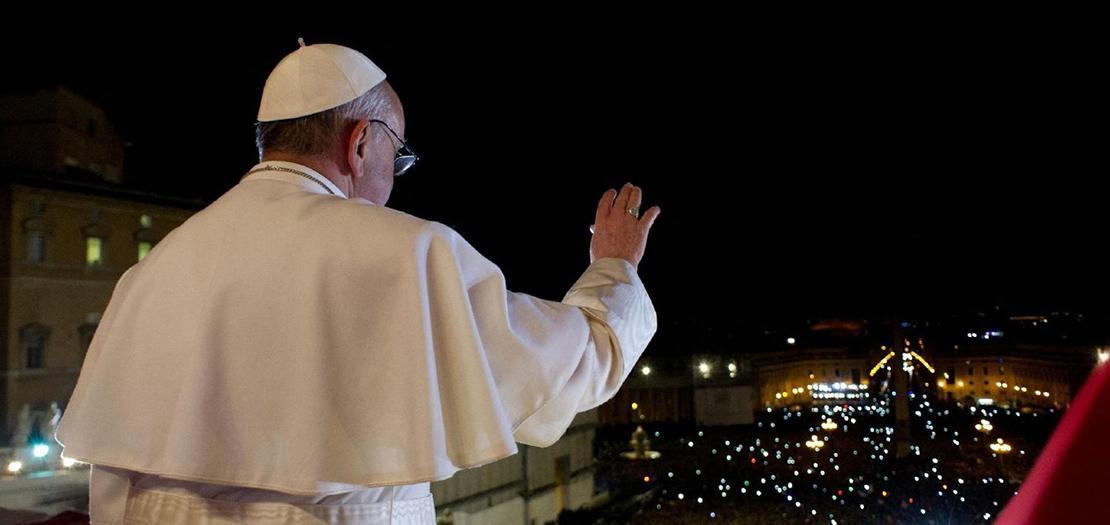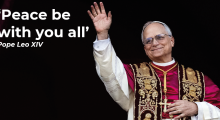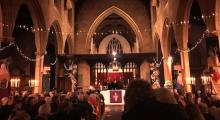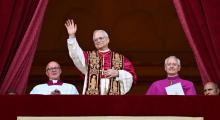Issued by the Catholic Center for Studies and Media - Jordan. Editor-in-chief Fr. Rif'at Bader - موقع أبونا abouna.org

"Time is greater than space": this statement by Pope Francis, contained in his first Apostolic Exhortation, Evangelii gaudium, encapsulates the ten years that have passed since the beginning of his pontificate. In fact, for Jorge Mario Bergoglio - the first Jesuit Pope, the first native of Latin America, the first to choose the name Francis and, in modern times, to be elected after his predecessor's resignation - "space hardens processes, whereas time propels towards the future and encourages us to go forward in hope."
Here, then, this understanding of time becomes a key to interpreting the current pontificate, which unfolds in two ways: one progressive and the other circular. The first is the one that allows one to "initiate processes"; the second, on the other hand, is the dimension of encounter and fraternity.
In the progressive dimension there is, first of all, the Apostolic Constitution Praedicate evangelium: promulgated in 2022, it gives a more missionary structure to the Curia. Among the novelties introduced are the establishment of the Dicastery for the Service of Charity and the new Dicastery for Evangelisation, headed directly by the Pope. The document also focuses on the involvement of laymen and laywomen in the Roman Curia and finalises the numerous reforms implemented, over a decade, by Pope Francis in the economic and financial spheres, including the establishment of the Secretariat for the Economy in 2015.
The processes initiated by Pope Francis also concern ecumenism, interreligious dialogue and synodality. In 2015, the World Day of Prayer for the Care of Creation was established, to be celebrated every year on 1 September together with the Orthodox Church, to exhort Christians to an 'ecological conversion'. An exhortation also reiterated in the Pope's second encyclical (the first, Lumen fidei, is shared with his predecessor, Benedict XVI), Laudato si' on the care of the common home, also published in 2015. The main thrust of the document is the exhortation for a 'change of course' so that humanity takes responsibility for a commitment to 'care for our common home'. A commitment that also includes the eradication of misery, care for the poor and fair access for all to the planet's resources.
On 12 February 2016, in Cuba, Pope Francis met the Patriarch of Moscow and All Russia, Kirill, and with him signed a joint declaration to put into practice 'the ecumenism of charity', that is, the common commitment of Christians to build a more fraternal humanity. A tragically topical commitment when, on 16 March 2022, at the height of the war in Ukraine, Pope Francis and Patriarch Kirill had a conversation via videoconference in which they reaffirmed their common effort to "stop the fire" by focusing on the "negotiation process".
Unforgettable, also, is the ecumenical peace pilgrimage to South Sudan, made last month by the Pope together with the Archbishop of Canterbury, Justin Welby, and the Moderator of the General Assembly of the Church of Scotland, Iain Greenshields.
As for interreligious dialogue, a milestone is represented by the 'Document on Human Fraternity for World Peace and Living Together,' signed on 4 February 2019 by the Pope and the Grand Imam of Al-Azhar Ahmad Al-Tayyeb, in Abu Dhabi. The text is a milestone in relations between Christianity and Islam, as it encourages interreligious dialogue and unequivocally condemns terrorism and violence. On the synodality front, Pope Francis is implementing an important change: the next ordinary general assembly, the 16th, scheduled in the Vatican in two stages, in 2023 and 2024, on the theme 'For a synodal Church: communion, participation and mission', will be the concluding stage of a three-year journey made up of listening, discernment, consultation and divided into three phases: diocesan, continental, universal.
In Pope Francis' progressive time frame, there is also the fight against abuse at the top of which is the summit on the protection of minors, held in the Vatican in February 2019. A clear expression of the Church's desire to act with truth and transparency, the meeting resulted in the Motu proprio Vos estis lux mundi, which establishes new procedures for reporting harassment and violence and ensuring that bishops and religious superiors are accountable.
The Pope's 'circular time' also includes a relentless commitment to peace. An admirable expression of this is the encyclical Fratelli tutti. Released on 4 October 2020, it calls for fraternity and social friendship and firmly says no to war. Two years later, when the conflict in Ukraine exploded, the exhortation contained in this document for a 'real and lasting peace' that starts from 'a global ethic of solidarity' will seem prophetic, in a world that is increasingly experiencing 'a third world war fought piecemeal'.
Other examples of this 'diplomacy of peace' promoted by the Pope are the 'Invocation for peace in the Holy Land', held on 8 June 2014 in the Vatican Gardens together with the presidents of Israel, Shimon Peres, and Palestine, Mahmoud Abbas; and the establishment of diplomatic relations between the United States and Cuba, on 17 December of the same year. A historic event for which Pope Francis himself spent months sending missives to the heads of state of the two countries, Barack Obama and Raúl Castro, urging them to "start a new phase".
Also along the same lines is the provisional agreement between the Holy See and the People's Republic of China on the appointment of bishops, stipulated in 2018, renewed in 2020 and extended for another two years in 2022.
Moreover, in this last year, marked by the conflict in Ukraine, the Pope has been personally committed to peace. On 25 February 2022, he visited the Ambassador of the Russian Federation to the Holy See, Alexander Avdeev, and on several occasions spoke by phone with the Ukrainian President, Volodymyr Zelensky. His appeals to silence all weapons have also been numerous.
Evangelisation - or rather, the passion for evangelisation, as the theme of the cycle of catechesis at the General Audience currently underway states - is also part of the Pope's 'circular' temporal dimension. Made explicit in 2013 in Evangelii gaudium, evangelisation must be characterised by joy, by the 'beauty of God's saving love', by a Church 'going out', close to the faithful, ready for the 'revolution of tenderness'.
Moreover, Pope Francis enjoys a strong connection with his predecessors, marked, on 27 April 2014, by the canonisation of Pope Saints John XXIII and John Paul II. They were joined by Paul VI, canonised on 14 October 2018, and John Paul I, beatified on 4 September 2022, whose smile the current Pope remembers, a symbol of "a Church with a joyful face".
However, a special place belongs to Pope Emeritus Benedict XVI, who passed away on 31 December 2022. In ten years, the Pope has never hidden the immense respect he feels for Joseph Ratzinger. On several occasions, he has praised his theological finesse, kindness and dedication. On 5 January this year, he presided over his funeral in St. Peter's Square, the first Pope in modern times to celebrate the funeral of one of his predecessors.
An now, Pope Francis begins the eleventh year of his pontificate, and he does so accompanied by hope: "he who hopes will never be disappointed," says the Pope, "because hope has the face of the Risen Lord."







